
Assistant Professor
Department of Computer Science and Engineering
Chung-Ang University @Seoul, Korea
I am an assistant professor in Department of Computer Science and Enginnering at Chung-Ang University.
Before that, I received Ph.D. in School of Computing at KAIST
and my advisor was Prof. Uichin Lee.
I received my M.S. degree in Culture Technology from KAIST in 2019 and I was under the supervision of Prof. Byungjoo Lee from 2017 to 2020.
I worked for SK Hynix as an R&D researcher from 2015 to 2017.
I received my B.S. degree in Material Science and Engineering from KAIST in 2015.
I am interested in user modeling and multimodal interaction. I have been working on quantifying the user's physical and cognitive performance based on multimodal sensor fusion in terms of Human-Computer Interaction. Further, I have been extending the scope to modeling the characteristics of user's behavior in various types of interaction.
Other than the academic things, I am a lover of adventure and sports. Playing games 🎮, driving 🚗, golf ⛳, and talking with inspiring people 🕊 always perk me up.
Related website
IX Lab in Chung-Ang Univ.
• Conference & Journal Papers
Kyoungwon Cha*, Dongjin Park*, Yejin Choi, Eunji Park+, and Joon-Woo Lee+
ACM IMWUT 2025 Paper
Human Digital Twins for Pervasive Healthcare: A Scoping Review
Joonyoung Park*, Eunji Park*, Duri Lee, Soowon Kang, Takyeon Lee, Hwajung Hong, Sung-Ju Lee, Heepyung Kim, Yu Rang Park, and Uichin Lee
Health Informatics Journal (2025)
MagPie: Extending a Smartphone's Interaction Space via a Customizable Magnetic Back-of-Device Input Accessory
Insu Kim, Suhyeon Shin, Junseob Kim, Jaemin Choi, Junhyub Lee, Sangeun Oh, Eunji Park, and Hyosu Kim
ACM CHI 2025 Paper
Hide-and-seek: Detecting Workers' Emotional Workload in Emotional Labor Contexts Using Multimodal Sensing
Eunji Park, Duri Lee, Yunjo Han, James Diefendorff, and Uichin Lee
ACM IMWUT 2024 Paper Download paper
Charlie and the Semi-Automated Factory: Data-Driven Operator Behavior and Performance Modeling for Human-Machine Collaborative Systems
Eunji Park, Yugyeong Jung, Inyeop Kim, Uichin Lee
ACM CHI 2023 Paper Download paper 28.39% Acceptance rate
Secrets of Gosu: Understanding Physical Combat Skills of Professional Players in First-Person Shooters
🏆 Honorable Mention Award (top 5%)
Eunji Park, Sangyoon Lee, Auejin Ham, Minyeop Choi, Sunjun Kim, and Byungjoo Lee
ACM CHI 2021 Paper Download paper / Talk(Remote presentation) 26.3% Acceptance rate
An Intermittent Click Planning Model
🏆 Honorable Mention Award (top 5%)
Eunji Park and Byungjoo Lee
ACM CHI 2020 Paper Download paper / Talk(Remote presentation) 23.8% Acceptance rate
Moving Target Selection: A Cue Integration Model
Byungjoo Lee, Sunjun Kim, Antti Oulasvirta, Jong-In Lee, and Eunji Park
ACM CHI 2018 paper Download paper 25.7% Acceptance rate
• Other publications
LibPad: Analyzing the Impact of OS-Specific Transfer Functions on Touchpad Pointing Performance
Been An, Hojoon Lee, and Eunji Park
ACM UIST 2025 Poster
"Gross!": Personalized Video Content Moderation Using Generative Image Overlays for Aversive Videos
Yejin Choi, Dohwa Kim, Youngeun Jun, Hyosu Kim, and Eunji Park
ACM UIST 2025 Poster
Voice to Victory: Modeling In-Game Voice Communication for Team Coordination in MOBA Games
Yongchan Son and Eunji Park
ACM UIST 2025 Poster
An Audio-Visual Framework for Transcription and Fingering Optimization in Bass Guitar Performance
Hyunwoo Bae, Taegyun Kwon, and Eunji Park
ACM UIST 2025 Poster
Minwon 99: Malicious Civil Complaint Filtering System Using LLM-Based Text Emotion Moderation
🏆 Best Paper Award
Seongmin Choi, Hohyun Song, Yeonghwan Shin, Kyusung Lee, Eunji Park
HCI KOREA 2025 Paper
Download paper
Measuring Device-Specific Physical Activity Trackability in Multi-Device Environments
Sangjun Park, Eunji Park, Paul H Lee, Uichin Lee
IEEE BigComp 2023 Download paper
Button++: Designing Risk-aware Smart Buttons
Eunji Park, Hyunju Kim and Byungjoo Lee
ACM CHI 2018 LBW Download paper
A Study on the Effect of Inter Key Spacing on Typing Performance
Hyunju Kim, Eunji Park and Byungjoo Lee
HCI KOREA 2018 Paper
2024 Recognition for Outstanding Teaching (Fall), School of CSE , Chung-Ang University
2024 Recognition for Outstanding Teaching (Spring), School of CSE , Chung-Ang University
2023 Outstanding TA Award (CS206 Data Structure), School of Computing , KAIST
2022 Outstanding TA Award (CS592 Sensor Data Science), School of Computing , KAIST
2022 Outstanding TA Award (CS206 Data Structure), School of Computing , KAIST
2021 NAVER PhD Fellowship Award , Naver
2021 Research Grant for Ph.D. Students , NRF (National Research Foundation of Korea)
2021 Best Paper Honorable Mention Award , ACM CHI 2021
2020 Best Paper Honorable Mention Award , ACM CHI 2020
2019 Kimyounghan Global Leader Scholarship
2017 Wonkwangyeon Hall Exibition Competition - 'Water lily', Grand Prize
2014 Taewool Music Concours - Silver Prize
• Organizing
2021 UbiComp/ISWC 2021 Student Volunteer
2019 SIGCHI Korea Local Chapter Workshop Local Co-Chair
• Reviewing
IMWUT '24, '25'
TEI WIP '21
CHI LBW '21, '20
CHI PLAY WIP '20, '19
CSCW Poster '20
• Instructor
Human Interface Media (Department of CSE, Chung-Ang University) '24
Software Project (Department of CSE, Chung-Ang University) '24
Creative Design for Software (Department of CSE, Chung-Ang University) '24, '25
Object-Oriented Programming (Department of CSE, Chung-Ang University) '23
Principles of Programming Language (Department of CSE, Chung-Ang University) '23, 24
• Teaching Assistant
2022 KAIST CS592 Sensor Data Science (Spring)
2021 KAIST CS206 Data Structure (Fall)
2021 KAIST KSE531 HCI Theory & Pratice (Spring)
2020 KAIST CTP404 Making Things (Spring)
2019 KAIST CS564 Introduction to Data Analytics Using R (Spring)
2017 KAIST GCT741 Human-Computer Interaction
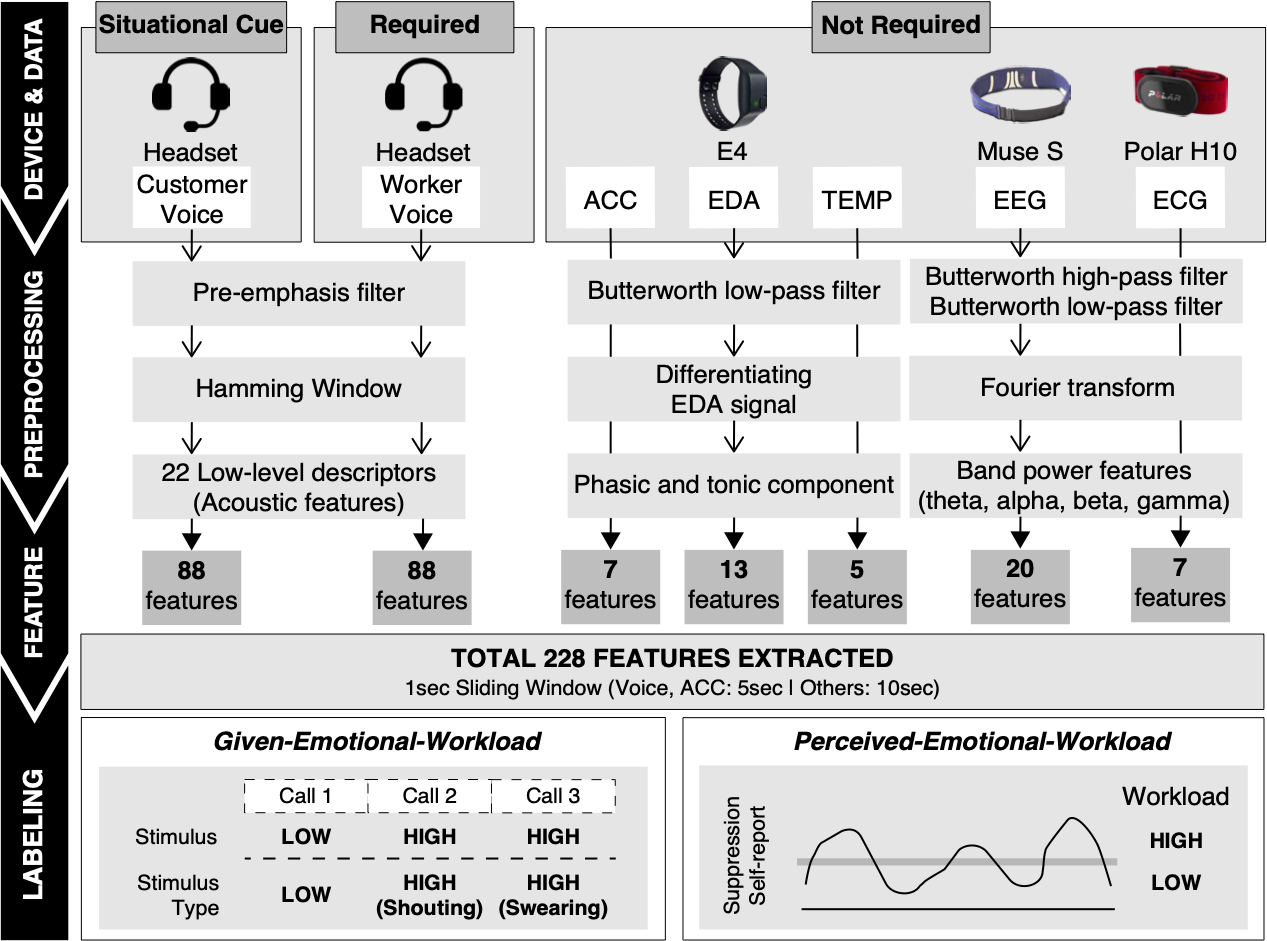
Emotional labor refers to the process in which workers are required to express emotions regardless of their actual feelings by the organization. In workplaces where such display rules exist, workers experience an emotional workload. Continued exposure to emotional workload can lead to severe mental and psychological issues. Nevertheless, research on assessing emotional workload remains understudied. In this study, we propose a machine learning model to automatically evaluate workers' emotional workload in emotional labor situations through multimodal sensing. The data collection study was designed based on a call center scenario. Within the study, we manipulated customer behaviors as confederates and assessed the worker's emotional workload. As a result, this study provides a benchmark using well-known features and standard machine learning methods. We achieved an accuracy of up to 87% for binary and three-class classification cases. Finally, we discuss the significance of assessing emotional workload and considerations for its practical application in the workplace.
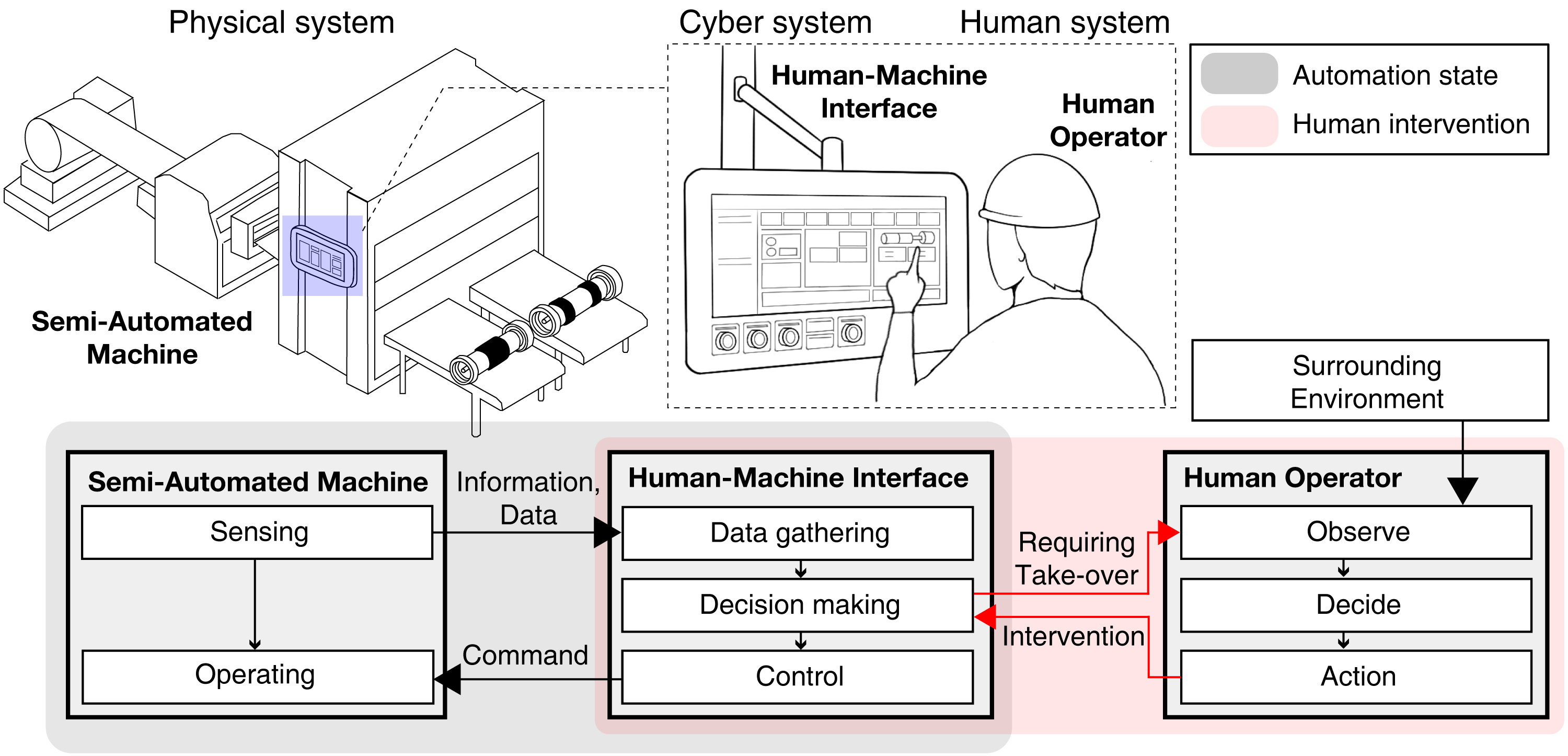
A semi-automated system that entails human intervention in the middle of the process is a representative collaborative system. User behavior greatly impacts system operation and performance. There has been room for utilizing machine-generated data for a fine-grained understanding of the relationship between the behavior and performance of operators in the industrial domain. In this study, we propose a large-scale data analysis methodology that comprises data contextualization and performance modeling to describe the relationship between operator behavior and performance. For a case study, we collected machine-generated data over six months from a highly automated machine in a tire manufacturing facility. We propose a set of metrics consisting of six human-machine interaction factors and five work environment factors as independent variables, and three performance factors as dependent variables. Our modeling results reveal that the performance variations can be explained by the interaction and work environment factors (R^2 = 0.502, 0.356, and 0.500).
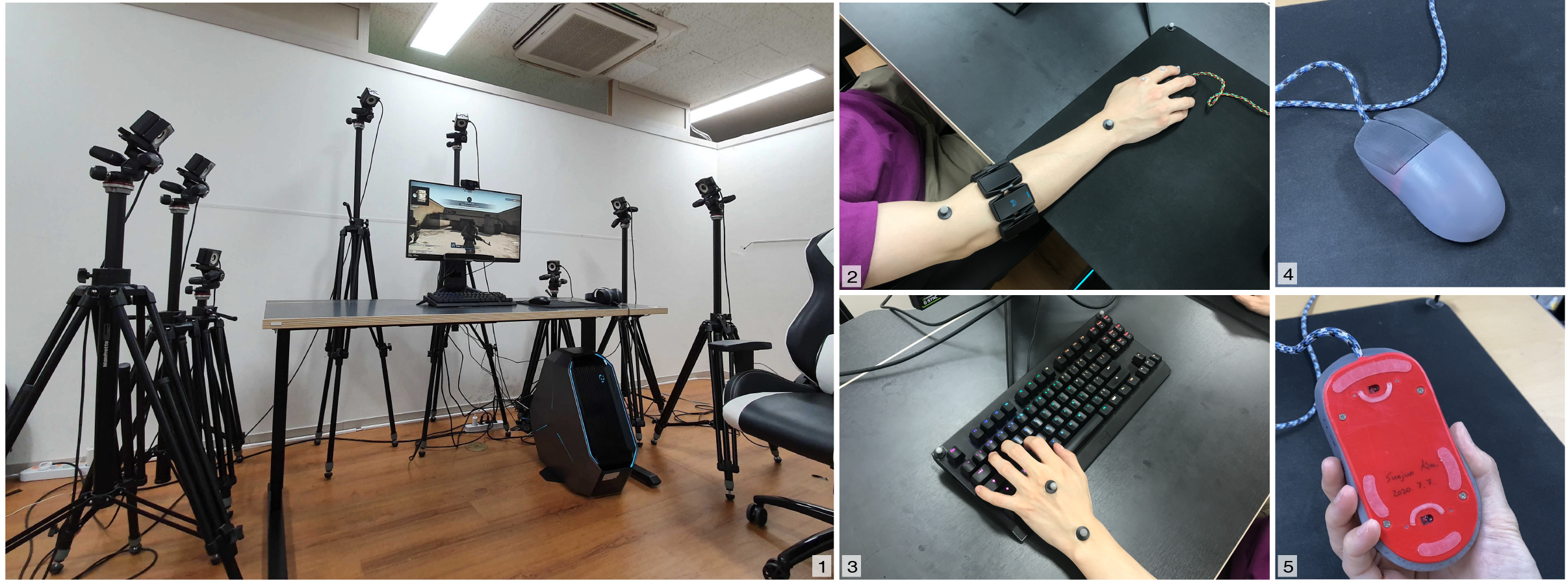

In first-person shooters (FPS), professional players (a.k.a., Gosu) outperform amateur players. The secrets behind the performance of professional FPS players have been debated in online communities with many conjectures; however, attempts of scientific verification have been limited. We addressed this conundrum through a data-collection study of the gameplay of eight professional and eight amateur players in the commercial FPS Counter-Strike: Global Offensive. The collected data cover behavioral data from six sensors (motion capture, eye tracker, mouse, keyboard, electromyography armband, and pulse sensor) and in-game data (player data and event logs). We examined conjectures in four categories: aiming, character movement, physicality, and device and settings. Only 6 out of 13 conjectures were supported with statistically sufficient evidence.
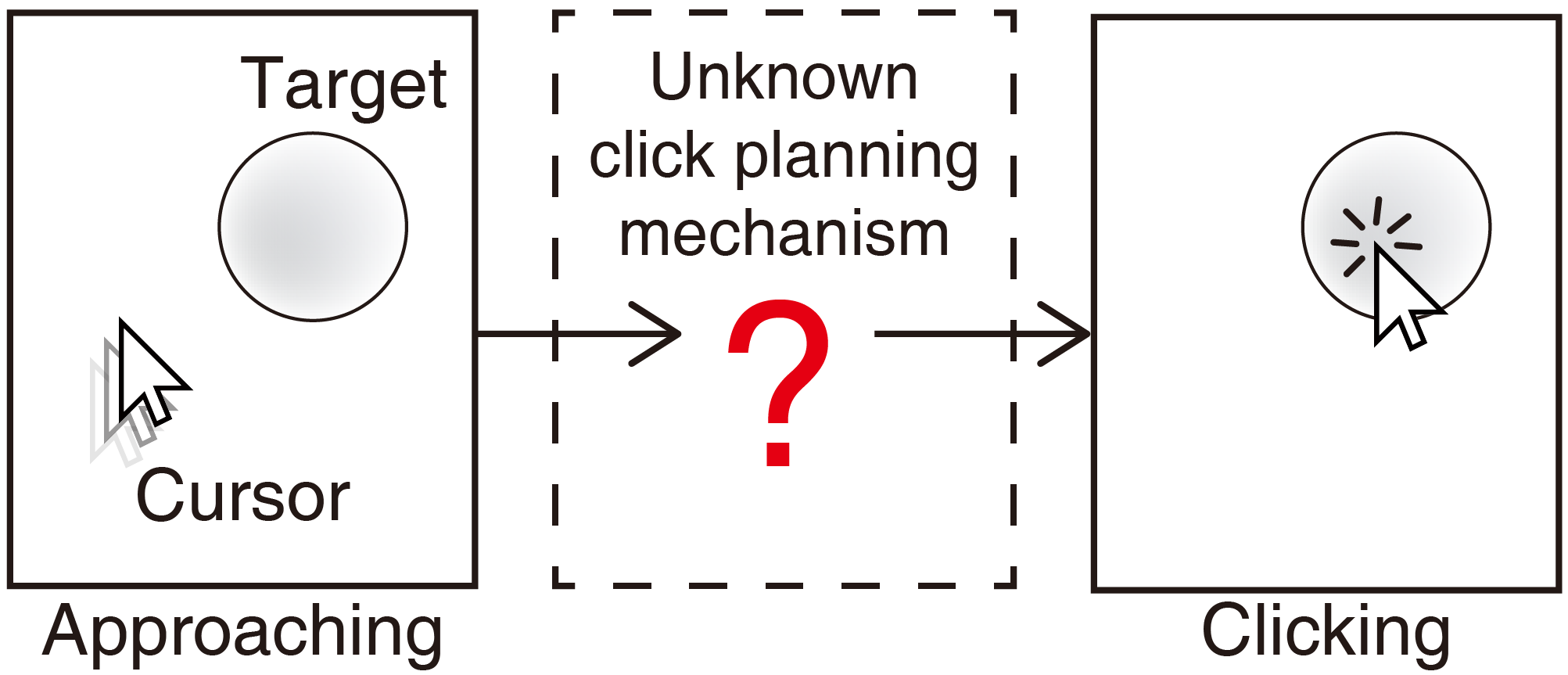
Pointing is the task of tracking a target with a pointer and confirming the target selection through a click action when the pointer is positioned within the target. Little is known about the mechanism by which users plan and execute the click action in the middle of the target tracking process. The Intermittent Click Planning model proposed in this study describes the process by which users plan and execute optimal click actions, from which the model predicts the pointing error rates. In two studies in which users pointed to a stationary target and a moving target, the model proved to accurately predict the pointing error rates (R2 = 0.992 and 0.985, respectively). The model has also successfully identified differences in cognitive characteristics among first-person shooter game players.
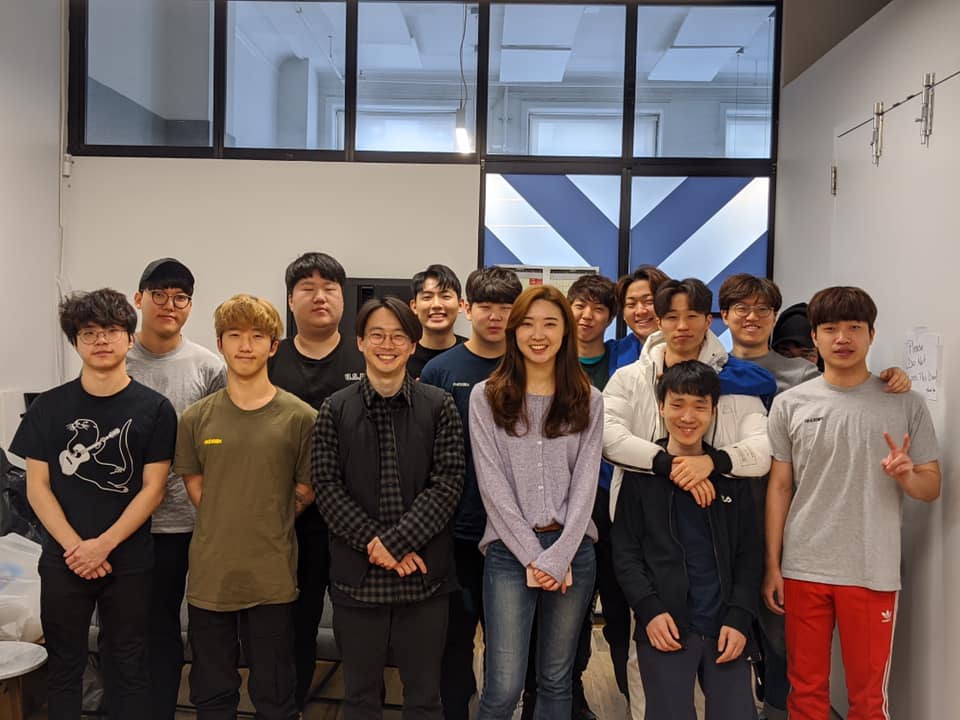
Esports is sports; this is the foundational idea that initiated our current research project. The economic values and market size of Esports have been skyrocketing each year. With such an influx of attention, Esports eco-systems, such as league operations and player management, are resembling more like other traditional sports in many aspects. However, unlike other conventional sports, Esports still lack scientific approaches, especially in player training and drafting. Researchers from diverse scientific fields, from physiology, biomechanics, kinesiology to sports medicine, have been supporting the advancement of the performances of traditional sports athletes. We believe that similar cooperation is evident in Esports as well. Since it involves dynamic interaction between players and computers, different scientific approaches are necessary, such as Human-Computer Interaction.
According to many FPS game players, to defeat opponents in the game requires two essential abilities: mechanics and strategy. Of those, we have focused on the individual player’s personal physical and cognitive ability, which define the mechanics. To compare the performance individually, we tried to quantify and measure the abilities based on the mathematical models. So far, we have completed numerous research on measuring cognitive abilities; the papers ‘Temporal Pointing’, ‘Moving Target Selection’, and ‘ICP Model’ have been verified and submitted to the ACM CHI conference, a top-tier conference on the Human-Computer Interaction field. -- Request full report
About Exibition
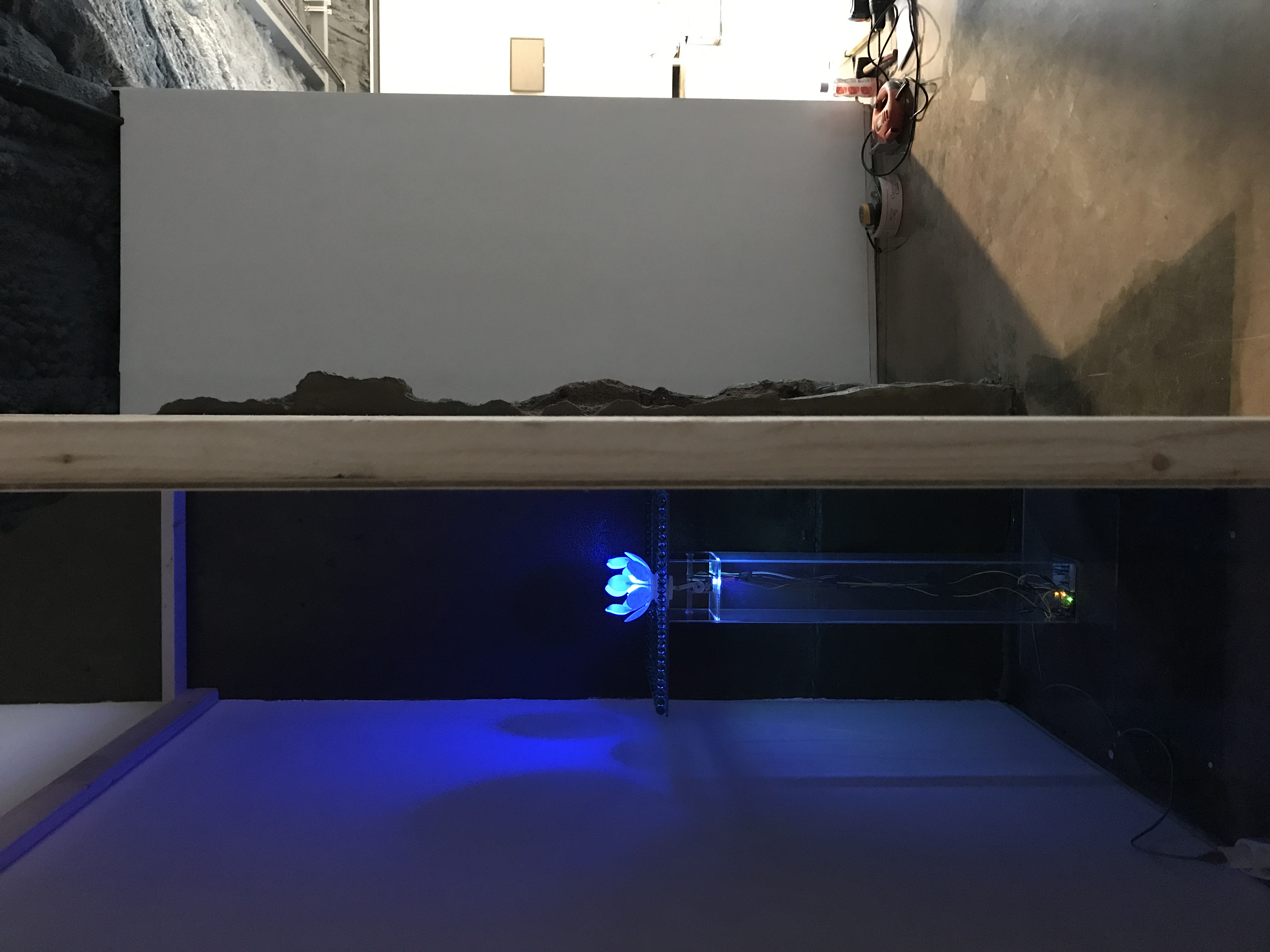
updated on 17 Sep, 2023